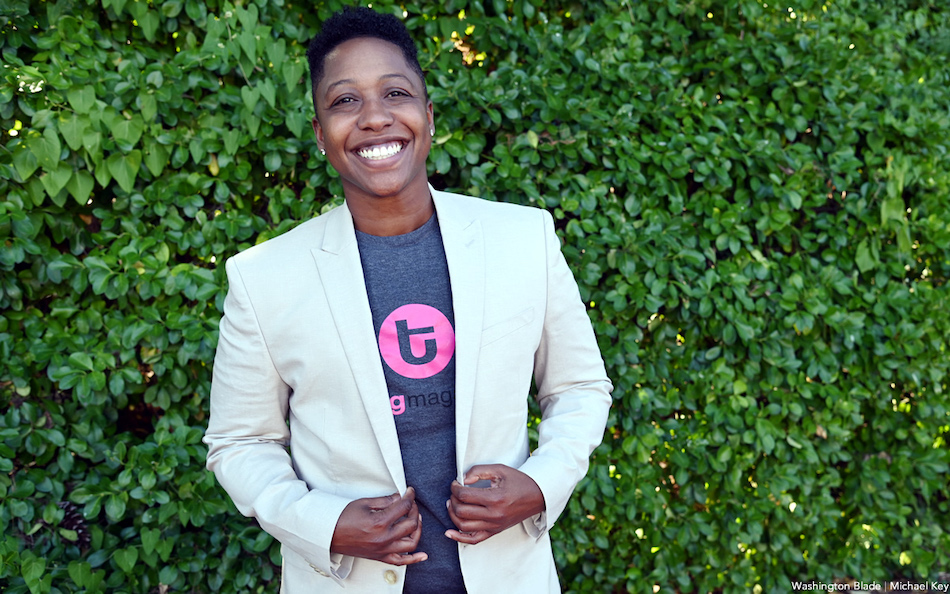
‘Tagg is a form of resistance,’ says editor Eboné Bell. (Washington Blade photo by Michael Key)
D.C. magazine thriving post-pandemic with focus on queer women
By Tinashe Chingarande | Washington Blade
Courtesy the LGBT Media Association
In a 10-year-old YouTube video, owner and editor of Tagg magazine, Eboné Bell, — clad in a white cotton T-shirt, gray vest and matching gray fedora — smiled with all her pearly whites as a correspondent for the magazine interviewed her outside now-closed Cobalt, a gay club in downtown D.C. that hosted the magazine’s official launch in the fall of 2012.
“I want to make sure that people know that this is a community publication,” Bell said in the video. “It’s about the women in this community and we wanted to make sure that they knew that ‘This is your magazine.’”
As one of just two queer womxn’s magazines in the country, Tagg has established itself as one of the nation’s leading and forthright LGBTQ publications that focuses on lesbian and queer culture, news, and events. The magazine is celebrating its 10th anniversary this month.
Among the many beats Tagg covers, it has recently produced work on wide-ranging political issues such as the introduction of the LGBTQ+ History Education Act in the U.S. House of Representatives and the Supreme Court’s assault on reproductive rights through a reversal of its landmark Roe v. Wade ruling; and also attracted the attention of international queer celebrities, including Emmy-nominated actress Dominique Jackson through fundraisers.
“Tagg is a form of resistance,” Bell said in a Zoom interview with the Washington Blade. “I always say the best form of activism is visibility and we’re out there authentically us.”
Although the magazine was created to focus on lifestyle, pressing political issues that affect LGBTQ individuals pushed it to dive deeper into political coverage in efforts to bring visibility to LGBTQ issues that specifically affect queer femme individuals.
“We know the majority of our readers are queer women,’ said Bell. “[So] we always ask ourselves, ‘How does this affect our community?’ We are intentional and deliberate about it.”
Rebecca Damante, a contributing writer to the magazine echoed Bell’s sentiments.
“The movement can sometimes err toward gay white men and it’s good that we get to represent other groups,” said Damante. “I feel really lucky that a magazine like Tagg exists because it’s given me the chance to polish my writing skills and talk about queer representation in media and politics.”
Tagg’s coverage has attracted younger readers who visit the magazine’s website in search of community and belonging. Most readers range between the ages of 25 and 30, Bell said.
“[The magazine] honestly just took on a life of its own,” said Bell. “It’s like they came to us [and] it makes perfect sense.”
Prior to the magazine becoming subscription-based and completely online, it was a free publication that readers could pick up in coffee shops and distribution boxes around D.C., Maryland, and Virginia.
Battling the pandemic
When the COVID-19 pandemic struck in 2020, newsrooms across the world were forced to function virtually. Additionally, economic strife forced many publications to downsize staffs and — in some cases — cancel entire beats as ad revenue decreased, forcing them to find alternative ways to self-sustain financially. Tagg was no exception.
“We didn’t fly unscathed,” said Bell. “[The pandemic] took a huge emotional toll on me because I thought we were going to close. I thought we were going to fail.”
However, the magazine was able to stand firm after a fundraiser titled “Save Tagg Magazine” yielded about $30,000 in donations from the community.
The fundraiser involved a storefront on Tagg’s website where donations of LGBTQ merchandise were sold, including a book donated by soccer superstar Megan Rapinoe.
There was also a virtual “Queerantine Con” — an event that was the brainchild of Dana Piccoli, editor of News Is Out— where prominent LGBTQ celebrities such as Rosie O’Donnell, Lea DeLaria and Kate Burrell, gave appearances to help raise money that eventually sustained the publication.
“There was a time where I was ready to be like ‘I have to be OK that [Tagg] might not happen anymore,” said Bell. “But because of love and support, I’m here.”
While the outpouring of love from community members who donated to the magazine helped keep the magazine alive, it was also a stark reminder that smaller publications, led by women of color, have access to fewer resources than mainstream outlets.
“It’s statistically known that Black women-owned businesses get significantly less support, venture capital investments, things like that,” said Bell. “I saw similar outlets such as Tagg with white people making $100,000 a month.”
Bell added that Tagg had to work “10 times harder” to survive, and although the magazine didn’t cut back on the people who worked for it, it ended free access to the magazine in the DMV especially as the places that housed the magazine were no longer in business. The publication also moved to a subscription-based model that allowed it to ameliorate printing costs.
Despite the challenges brought about by the pandemic, Tagg remains steadfast in its service to the LGBTQ community. The magazine hired an assistant editor in 2021 and has maintained a team of graphic designers, photographers, writers and an ad sales team who work to ensure fresh content is delivered to readers on a regular basis.
For Bell, Tagg mirrors an important life experience — the moment she discovered Ladders, a lesbian magazine published throughout the 1950s, 1960s and early 1970s.
“To that young person coming up, I want you to see all the things that happened before them, all the people that came before them, all the stories that were being told” she said.











